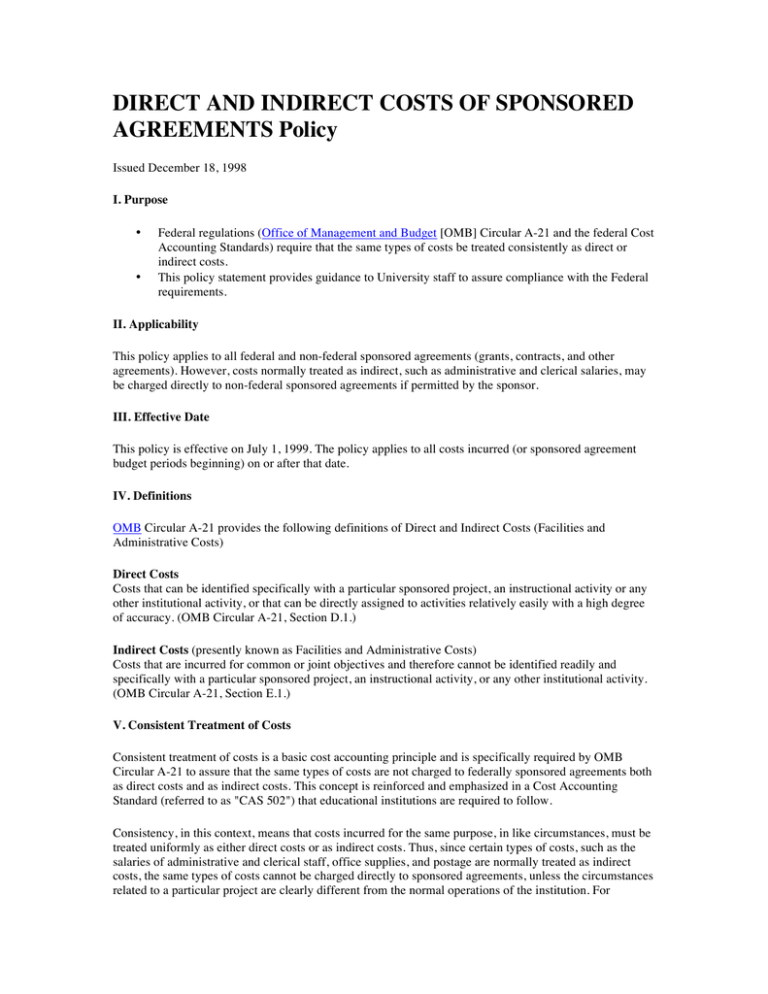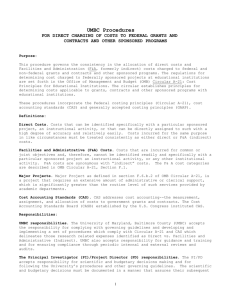DIRECT AND INDIRECT COSTS OF SPONSORED AGREEMENTS Policy
advertisement

DIRECT AND INDIRECT COSTS OF SPONSORED AGREEMENTS Policy Issued December 18, 1998 I. Purpose • • Federal regulations (Office of Management and Budget [OMB] Circular A-21 and the federal Cost Accounting Standards) require that the same types of costs be treated consistently as direct or indirect costs. This policy statement provides guidance to University staff to assure compliance with the Federal requirements. II. Applicability This policy applies to all federal and non-federal sponsored agreements (grants, contracts, and other agreements). However, costs normally treated as indirect, such as administrative and clerical salaries, may be charged directly to non-federal sponsored agreements if permitted by the sponsor. III. Effective Date This policy is effective on July 1, 1999. The policy applies to all costs incurred (or sponsored agreement budget periods beginning) on or after that date. IV. Definitions OMB Circular A-21 provides the following definitions of Direct and Indirect Costs (Facilities and Administrative Costs) Direct Costs Costs that can be identified specifically with a particular sponsored project, an instructional activity or any other institutional activity, or that can be directly assigned to activities relatively easily with a high degree of accuracy. (OMB Circular A-21, Section D.1.) Indirect Costs (presently known as Facilities and Administrative Costs) Costs that are incurred for common or joint objectives and therefore cannot be identified readily and specifically with a particular sponsored project, an instructional activity, or any other institutional activity. (OMB Circular A-21, Section E.1.) V. Consistent Treatment of Costs Consistent treatment of costs is a basic cost accounting principle and is specifically required by OMB Circular A-21 to assure that the same types of costs are not charged to federally sponsored agreements both as direct costs and as indirect costs. This concept is reinforced and emphasized in a Cost Accounting Standard (referred to as "CAS 502") that educational institutions are required to follow. Consistency, in this context, means that costs incurred for the same purpose, in like circumstances, must be treated uniformly as either direct costs or as indirect costs. Thus, since certain types of costs, such as the salaries of administrative and clerical staff, office supplies, and postage are normally treated as indirect costs, the same types of costs cannot be charged directly to sponsored agreements, unless the circumstances related to a particular project are clearly different from the normal operations of the institution. For example, although postage is normally treated as an indirect cost, a particular project may have a special need for postage because of the mailing of hundreds of survey questionnaires. In this case, it would be appropriate to charge the project directly for the postage to mail the questionnaires, since this would constitute "unlike circumstances" compared to routine postage requirements. VI. Direct Costs The following types of costs should be directly charged to sponsored agreements where they can be specifically identified to the work performed under the agreements. Salaries, Wages, Fringe Benefits • • • • • • Faculty Research Associates Postdoctoral Fellows Technicians Lab Assistants Students Performing Scientific or Technical Work Materials and Supplies • • • • • Chemicals Glassware Compressed Gases and liquids Computer Software Research Supplies Other Direct Costs • • • • • • Travel Consulting Services Printing Equipment Long Distance Telephone Charges Sub-Awards VII. Normal Indirect Costs A. ADMINISTRATIVE AND CLERICAL SALARIES AND FRINGE BENEFITS 1. 2. 3. As required by Circular A-21, the salaries of administrative and clerical staff shall normally be treated as indirect costs. They may be charged directly only under exceptional circumstances. (OMB Circular A-21, Section F.6.b.) Direct charging of administrative or clerical salaries may be appropriate where a major project explicitly budgets for administrative or clerical services and the individuals involved can be specifically identified to the project. Circular A-21 defines "major project" as a project that requires an extensive amount of administrative or clerical support, which is significantly greater than the routine level of such services provided by academic departments. Examples of "major project" where direct charging of administrative or clerical staff salaries may be appropriate, are given in Exhibit C of OMB Circular A-21 as follows: o Large, complex programs such as General Clinical Research centers, Primate centers, Program Projects, environmental research centers, engineering research centers, and other 4. 5. grants and contracts that entail assembling and managing teams of investigators from a number of institutions. o Projects which involve extensive data accumulation, analysis and entry, surveying, tabulation, cataloging, searching literature, and reporting (such as epidemiological studies, clinical trials, and retrospective clinical records studies). o Projects that require making travel and meeting arrangements for large number of participants, such as conferences and seminars. o Projects whose principal focus is the preparation and production of manuals and large reports, books and monographs (excluding routine progress and technical reports). o Projects that are geographically inaccessible to normal departmental administrative services. Such as research vessels, radio astronomy projects, and other research field sites that are remote from campus. o Individual projects requiring project-specific database management; individualized graphics or manuscript preparation; human or animal protocols; and multiple projectrelated investigator coordination and communications. Administrative and clerical salaries may be charged directly if they meet all of the following conditions: 1. They fall within the special circumstances described in Circular A-21. 2. The individuals have responsibilities specifically related to the work of the project and the effort devoted to the project is documented in the University's time and effort reporting system. 3. The title(s), percent of effort, and salary amount(s) for the clerical/administrative position(s) are included in the proposed budget of the sponsored agreement, and the special circumstances requiring direct charging of the services are justified in the proposal. 4. The sponsoring agency accepts the cost as part of the project's direct cost budget (i.e., does not specifically disapprove the cost in the award or other notification to the University). If an administrative or clerical salary meets the first two (2) conditions as listed in item 4., above, but was not included in the approved budget of the sponsored agreement, the salary may be charged directly to the agreement only where the University has rebudgeting authority under federal regulations or the terms of the sponsored agreement (please see specific award document or contact Office of Grant, Contract & Patent Administration [OGCPA] for internal/external rebudgeting requirements). The rebudgeting request must be in writing and the justification must include the same information that would have been provided in the proposed project budget, and must explain why the salary was not in the original budget. Approval of these requests will be given where OGCPA is satisfied that the sponsoring agency would have approved the cost had it been in the original budget or where external rebudgeting approval is required and agency approval is received. B. OTHER NORMAL INDIRECT COSTS 1. 2. The following costs are normally indirect. They may be charged directly only under special circumstances: o Office Supplies o Postage o Local Telephone Services o Memberships These costs may be directly charged only where they meet all of the following requirements: o The project has a special need for the item or service that is beyond the level of services normally provided. o The cost can be specifically identified to the work conducted under the project and is appropriately documented. o The cost is specified in the proposed budget of the sponsored agreement, and the special circumstances requiring direct charging are justified in the proposal. o 3. The sponsoring agency accepts the cost as part of the project's direct cost budget (i.e., does not specifically disapprove the cost in the award or other notification to the University). If the cost meets the first two (2) conditions listed in item 2., above, but was not included in the approved budget of the sponsored agreement, it may be charged directly to the agreement only where the University has rebudgeting authority under federal regulations or the terms of the sponsored agreement (please see specific award document or contact Office of Grant, Contract & Patent Administration [OGCPA] for internal/external rebudgeting requirements). The rebudgeting request must be in writing and the justification must include the same information that would have been provided in the proposed project budget, and must explain why the cost was not in the original budget. Approval of these requests will be given where OGCPA is satisfied that the sponsoring agency would have approved the cost had it been in the original budget or where external rebudgeting approval is required and agency approval is received. VIII. Contacts If you have any questions about this policy, how to treat a specific cost, or need information, please contact the Associate Controller for Sponsored Programs at x6-4423, the Assistant Controller of Cost Accounting at x6-4535, or the Internal Auditor at x6-4516.


